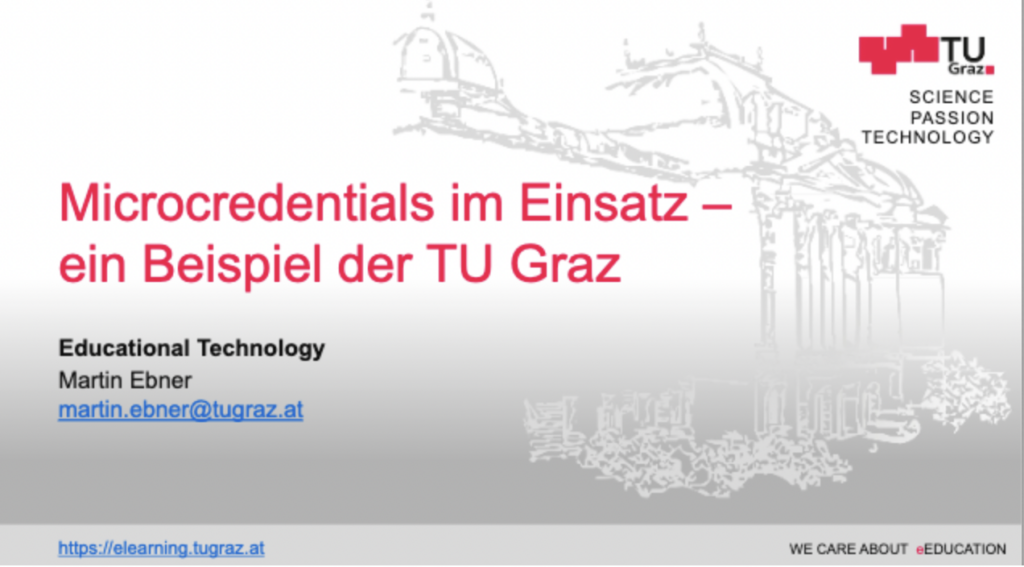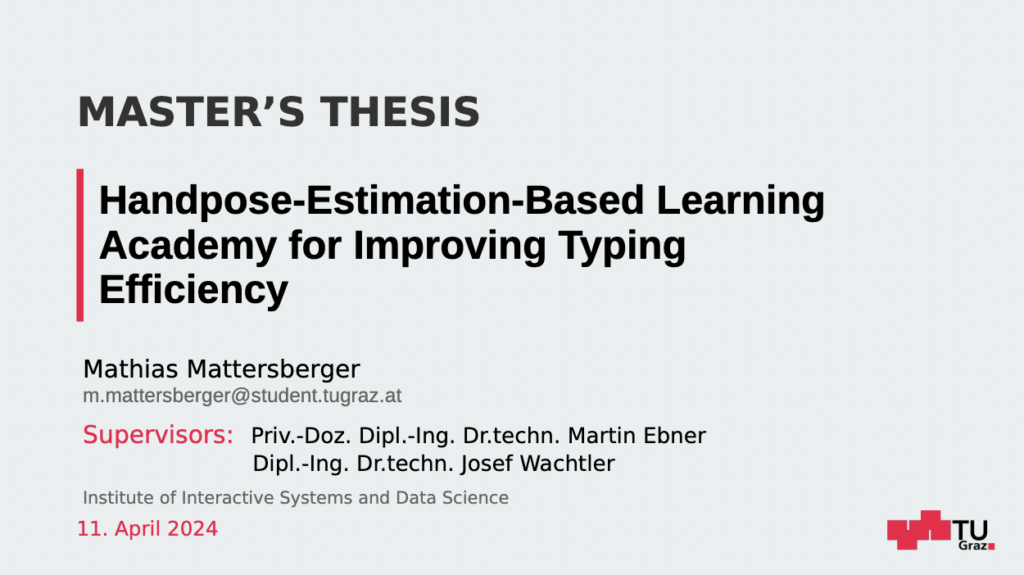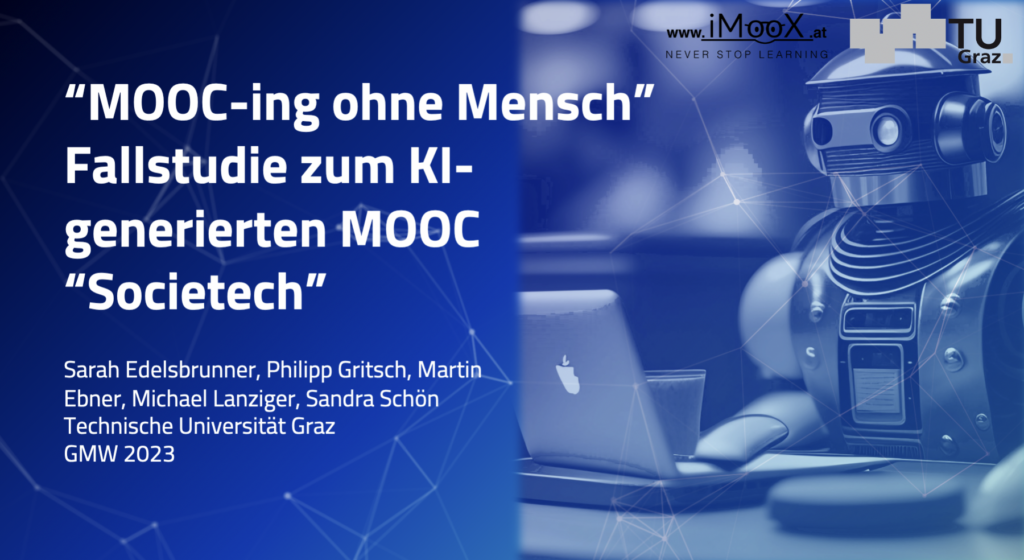Im Rahmen einer Evening Lecture an der TU Wien wurde ich eingeladen über die Aktivitäten der TU Graz im Bereich microcredentials.at an der TU Graz zu berichten. Dem bin ich natürlich gerne nachgekommen und hier gibt es nun den Foiensatz dazu:


Digitale Lehre an und rund um der Technischen Universität Graz
Neue Entwicklungen
Im Rahmen einer Evening Lecture an der TU Wien wurde ich eingeladen über die Aktivitäten der TU Graz im Bereich microcredentials.at an der TU Graz zu berichten. Dem bin ich natürlich gerne nachgekommen und hier gibt es nun den Foiensatz dazu:

Mathias did his master thesis about an innovative and new idea – using neural networks to estimate the hand pose while learning typing. Now we published his research in the International Journal of Interactive Mobile technologies.
Abstract:
This paper focuses on enhancing touch-typing skills through state-of-the-art deep learning technologies. It has been demonstrated that writing posture can be assessed using integrated keyboard detection and hand pose estimation in real-time browser environments. A unique dataset was created for training the object detection model to recognize individual keyboards. The object detection models were trained using various architectures and then assessed for both inference time and accuracy. In addition, a hand pose estimation was implemented to precisely recognize 21 knuckle points of the hand and compute their exact positions. In order to implement object detection and hand pose estimation, a stream transmission of the keyboard and hand scene is required. For this purpose, server-client communication via a QR code connection is implemented to transfer the stream between two mobile devices. Based on these deep learning technologies, a mobile web app was developed that offers 170 learning courses for touch-typing training. With the help of the Typing Learning Academy prototype, a study was conducted as part of this paper to evaluate the usability and utility of the learning app. This research demonstrates the potential for enhancing the development of writing skills through touch typing through the utilization of advanced deep learning technologies.
[full article @ journal’s homepage]
[full article @ ResearchGate]
Reference: Mattersberger, M., Wachtler, J., & Ebner, M. (2024). Handpose Estimation Based Learning Academy for Improving Typing Efficiency by Using Mobile Technologies. International Journal of Interactive Mobile Technologies (iJIM), 18(10), pp. 59–70. https://doi.org/10.3991/ijim.v18i10.49037
Mathias hat im Rahmen seiner Masterarbeit sich mit einem sehr interessanten Thema beschäftigt und zwar wie er das Erlernen des 10-Fingersystems unterstützen kann. Dazu verwendet er das Smartphone, filmt die Fingerbewegungen von oben und kann mit Hilfe von KI sehr sehr gut erkennen ob nicht nur das richtige Wort geschrieben wird, sondern ob auch die korrekten Finger verwendet werden. Hier gibt es noch die Folien von seiner erfolgreiche Verteidigung:

Mathias, M. (2024, April 11). Handpose-Estimation-Based Learning Academy for Improving Typing Efficiency. Graz University of Technology. https://doi.org/10.3217/ncg5h-arv14
I am happy to announce that we are currently working on another exciting OER-Project for our university alliace UNITE!:
In the fast-evolving landscape of higher education, the convergence of Open Science and Open Educational Resources (OER) is proving to be a transformative force. Unite! is taking a bold step forward by adopting the UNESCO recommendations on OER and Open Science to enhance the quality and accessibility of education.
In principle we are developing a multilingual OER-course for all partners and we will provide it as a MOOC @ imoox.at
Find more information at the UNITE! website or just register for the course right here [Registration page]
But before just watch our trailer:
Im Rahmen der GMW 2023 Jahrestagung haben wir heuer einen Beitrag zu unserem KI-generierten MOOC gemacht. Die Präsentation mit dem Titel „„MOOC-ing ohne Mensch“ Fallstudie zum KI- generierten MOOC „Societech““ steht nun online zur Verfügung:

One of our contributions to the HCII 2023 was titled „Perceived Effects of Mixed Reality in Distance Learning for the Mining Education Sector“ and it got published right now:
Abstract:
Mixed reality as a tool for teaching has made only limited use of its possibilities so far. However, it brings a plethora of new opportunities, with benefits ranging from interactivity to more vividness. These factors could improve numerous areas of teaching. The mining sector would benefit from new methods combined with mixed reality especially. Therefore, the MiReBooks project was launched: Various applications have been developed that can vividly present content using 3D models, virtual field trips and other methods. To verify and further improve these tools, an evaluation phase was conducted. During two test lectures in distance learning, a total of 23 participants answered a posttest questionnaire. The results showed that the teaching quality could be maintained well by the mixed reality application even in distance learning. Students were satisfied with the methods used, attributed good usability to the tool, and felt integrated into the classroom. At the same time, the team realized that the quality of the lesson depends heavily on the quality of the materials and the expertise of the lecturer. It also became clear that other factors, such as the technical infrastructure and support, are particularly important in this format.
[full article @ publisher’s homepage]
[draft @ ResearchGate]
Reference: Thurner, S., Schön, S., Ebner, M., Leitner, P., Daling, L. (2023). Perceived Effects of Mixed Reality in Distance Learning for the Mining Education Sector. In: Zaphiris, P., Ioannou, A. (eds) Learning and Collaboration Technologies. HCII 2023. Lecture Notes in Computer Science, vol 14041. Springer, Cham. https://doi.org/10.1007/978-3-031-34550-0_15
Our conference paper, titled „Practitioner Integrated Education for Vital Computational Thinking Skills„, at EDMedia and Innovative Learning 2023 conference in Vienna is published.
Abstract:
The leap from formal education to a modern work environment is often surprisingly difficult. Having young people struggle in these transitional periods while entrepreneurs and businesses strive to merge new team members is a worthy cause to investigate. The process of teacher education can not adequately cope with the intensity of technological and methodological progress. Based on expert-driven, participatory workshops in Austria, the effects and benefits of practitioner integration are evaluated. In multiple stages based on an action research methodology, the problem-solving approach of Computational Thinking (CT) was introduced to learners aged 16 to 18 (K-12) with the help of outside practitioners. This research project reveals the immense potential of expert integration in a secondary school classroom setting. The primary research question of “What consequences has practitioner integration on Computational Thinking education?” is answered. With the development of sustainable, interdisciplinary interfaces between teaching staff and industry experts a multitude of systemic problems in the educational system can be mitigated and the missing link to Computational Thinking education established. With all involved stakeholders and driven by the needs of young learners a robust and inclusive path to practitioner integrated Computational Thinking education is established.
[draft @ ResearchGate]
[article @ conference’s homepage]
Reference: Pollak, M., Ebner, M. & Sagbauer, N.N. (2023). Practitioner Integrated Education for Vital Computational Thinking Skills. In T. Bastiaens (Ed.), Proceedings of EdMedia + Innovate Learning (pp. 593-602). Vienna, Austria: Association for the Advancement of Computing in Education (AACE). Retrieved August 31, 2023 from https://www.learntechlib.org/primary/p/222704/.
We just wrote a short article about „The good and the bad of AI in education“ and summarized our work on „Harnessing the power of artificial intelligence and ChatGPT in education – a first rapid literature review“ for Education Technology Insights
You can acess it right here or get the draft version as .pdf as well
Reference: Ebner, M., Schön, S. & Jahic, I. (2023) The good and the bad of AI in education. Educational Technology Insights (online). https://student-engagement.educationtechnologyinsights.com/cxoinsights/the-good-and-the-bad-of-ai-in-education-nid-2451.html [.pdf]
Our publication titled „Makification – Bridging the Gap between Formal and Maker Education“ was presented at EDMedia and Innovative Learning 2023 conference and got published right now.
Abstract: To achieve appropriate education for the future, we propose a gradual process of makification in which characteristic elements of the maker movement are incorporated into formal educational activities. Using the existing literature, we deduce the need for a shift from teacher-centered to student-centered learning while integrating essential 21st century skills into the rigid framework of formal education through makification
[preprint @ ResearchGate]
[publication @ publisher’s homepage]
Reference: Sagbauer, N.N., Pollak, M. & Ebner, M. (2023). Makification – Bridging the Gap between Formal and Maker Education. In T. Bastiaens (Ed.), Proceedings of EdMedia + Innovate Learning (pp. 264-271). Vienna, Austria: Association for the Advancement of Computing in Education (AACE). Retrieved July 19, 2023 from https://www.learntechlib.org/primary/p/222513/